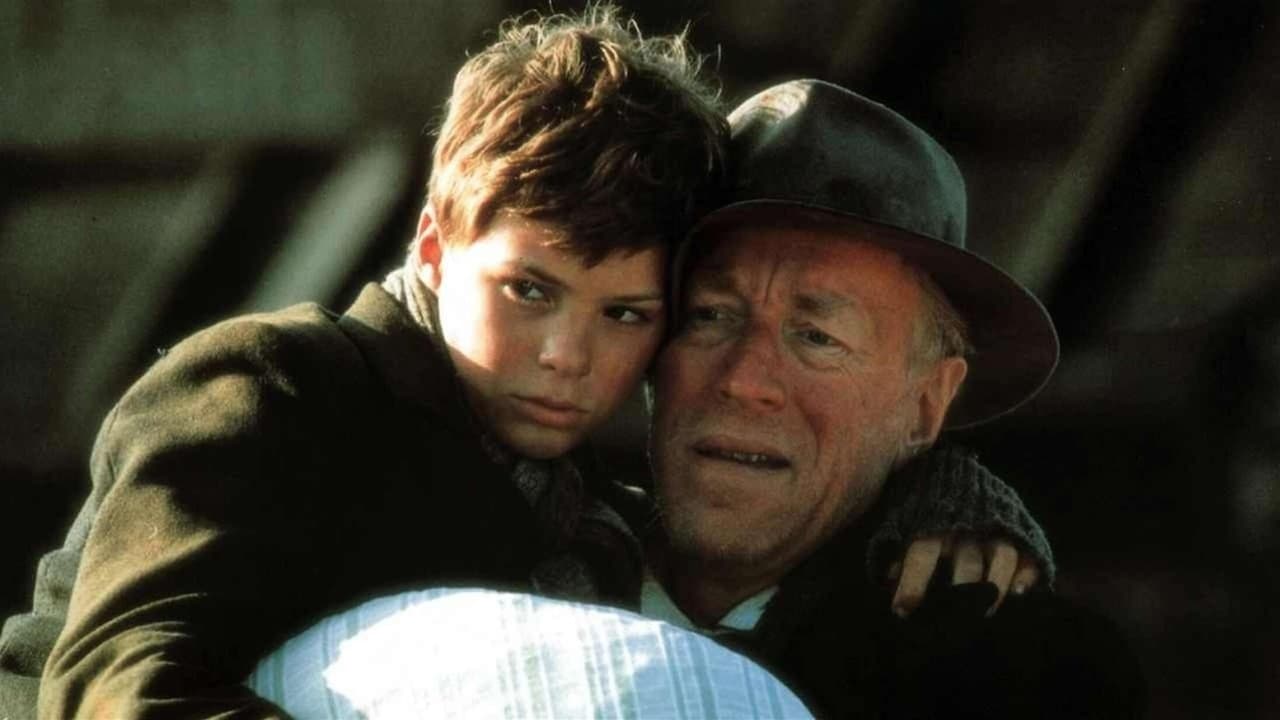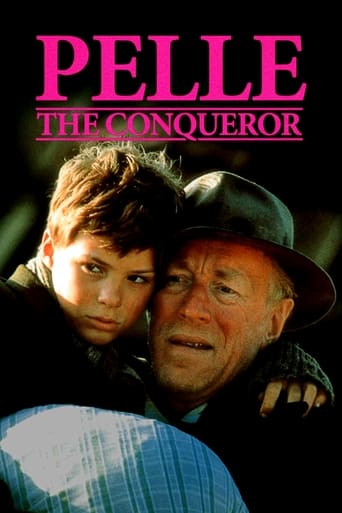

Who payed the critics
... View MoreA Major Disappointment
... View MoreA movie that not only functions as a solid scarefest but a razor-sharp satire.
... View MoreBlistering performances.
... View MoreFilm Review: "Pelle The Conqueror" (1987)Based on the Danish novel "Pelle Erobreren" from 1910 written by Martin Andersen Nexo (1869-1954) and adapted by Writer/Director Bille August in tedious work unfolding the story of a father, portrayed by heartbreaking fragile actor Max von Sydow as the character of Lasse, and his son Pelle, performed by career-sacrificing actor Pelle Hvenegaard born in 1975, given the title-given character a face to strive through a film that balances the lives of master and slave, poverty and riches on a farming entity at the end of 19th century Danemark, where father & son get lured to in order to survive in a life full of beatings, constant fighting and a few kisses along the way by finding happiness in the tiny little moments where life makes sense.Director Bille August skillfully turns a bible-like script with all its beats, blocking movements and vocal lines already prepared for the indulging cast, led by Swedish actor Max von Sydow born in 1929, who strips his soul in this picture to the raw of an shattered existence of a slowly dying man, who despite alcoholism and constant states of insolvency keeping his head high to lead his son to an existence of an higher society under the banner of embarrassment, bullying torture and ongoing hard-working hands. It is quiet moments in "Pelle The Conqueror" that lifts the film to an accomplished literature adaptation, enduring the test of time of now 30 years after principal photography by Jörgen Persson, who captures the essence of a streetlife before the Industrilization of the early 20th century in earthy brownish color and connecting camera movements in order to fulfill a string of eventful moments, keeping the suspension arc at an attention-demanding level for the audience to follow the evolution of the main characters, who experience life a follow-up of lessons until death with chances to settle down along the way. So become the strongest scenes in the picture, when the character of Lasse has been invited by Madame Olson to get served with a decent meal after weeks of sleeping in the barn accompanied with a grateful cup of high-quality liquor in order to conclude the visitation with kiss toward a relationship that never fulfills itself and Lasse remains a man broken by life, yet with the relentless drive to present his son Pelle with a better life, which eventually happens for the teenage boy in getting promoted on the farm to a foreworker of employees, who deal with pigs, cows and hens that his dream of immigrating to America burns like a flame in his heart that for the spectator becomes the eternal struggle of survival evident; the impossibilities of being too old as the character of Lasse or too young as in the case of Pelle to confront such a life-changing, root-annihilating endeavor."Pelle The Conqueror" initially premiered in Sweden on December 25th 1987 before conquering the Cannes Film Festival 1988 in its 41st edition under jury president director Etorre Scola (1931-2016), which led to the Academy Award for Best Foreign Language Feature on March 29 1989, building the counterpart to the fairy-tale like Best Picture Winner "Rain Man" (1988) directed by Barry Levinson, establishing a controversy with international spectator in which world one likes to dive into by reflecting two pictures as mirror for a generation born in the 1980s, where all fundamental conflicts in life result out of the constant complaint of a current situation as between the characters of Raymond & Charlie in "Rain Man", portrayed respectively by actors Dustin Hoffman and Tom Cruise, and the close to mutiny raging foreworkers led by actor Björn Granath (1946-2017) in the role of Erik on the farming estate in "Pelle The Conqueror", which shares further dark secrets of fetus river burials, planting wild strawberries from Sweden on a plain for taste, Cognac-drinking estate owners to kill the pain of a meaningless existence and an extreme bullying attack of whipping nature to stripped child skin, leaving the picture in a mesmerizing state to prevail time itself.© 2017 Felix Alexander Dausend (Cinemajesty Entertainments LLC)
... View MoreEarly capitalism had many virtues for economy, but many vices for people, particularly for those without heritage and funds. Denmark was no exception, in spite of being better-off than most countries in Europe, and as the writer - Martin Andersen Nexø - was leftist, the book behind the film is full of enhanced dramatics and deep depiction of injustice and poverty. Luckily, it is no blunt propaganda, but warm-hearted storytelling of survival and self-development amongst limited and often hindering options.The accomplishment is outstanding; Bille August has created a smooth script and performed skillful direction, but the real gems are characters and performers, particularly Max von Sydow as Lassefar "Lasse" Karlsson, Pelle Hvenegaard as Pelle Karlsson, Erik Paaske as Foreman. The Academy Award is well earned; pity that von Sydow had to lose his nomination to Dustin Hoffman (for Rain Man). Even when the events are not so interesting, seeming protracted, and unfairness is too grave to watch, then following masterful performances bring you soon back to track and the 2,5 hours pass without yawning.And last but not least - nature scenes, from the times were there were lots of uninhabited space and harsh winters. Thus, I regard the nature as a true supporting actor.Well, I have lived in Denmark and know Danish, so the film was particularly of interest to me. I am not sure how e.g. Southern Europeans would see it I personally would not have made time for watching life in Greece or Spain in the XIX century...
... View MoreThis is a difficult film to review, because it is pretty much all of its ingredients, so the best description of it would either be fifteen pages or fifteen words."The grass is greener" describes the motif pretty well.The usual description leads one to think it is totally about "Pelee", but that isn't the case. Many characters and many plots are in this film.I watched it with some expectations. Max von Sydow is one of the most respected names in acting, and even when he appears in high action apocalyptic films, there is some bit of "thinking" involved.We usually expect Sydow to be involved in works that are "mystical puzzles", such as "The Seventh Seal" and "The Reward".But sometimes, like this film, the film is about "reactions". In fact, two things that I was always conscious of while watching this were the title and the "reactions".Why was it called "Pele the Conqueror"? We come to that at the end.As for the "reactions", that too is a omen of the ending. The characters don't "think things through". They simply react.And that does give a very realistic view of the times and the people. It is a story of the hopes of people on a Scandinavian stone farm in the late 1800s. Don't be fooled into thinking that this is a dull "slice of life" film, though.I am not the most patient viewer, maybe a bit "attention deficit", but this film kept me interested throughout.I could say more, but then I wouldn't know where to stop. Hopefully, this review gives an idea of what to expect. It has good scenery, and is well made. I feel comfortable in saying that nearly everyone will be pleased by it, and most will be more than pleased.
... View MoreA quite good movie, with a truly great performance by Max Von Sydow. The film itself is overlong, and a bit too crowded with sub-plots that don't get developed enough. On the other hand, the intricate, specific details of the sad, Dickensian world of this Danish farm in the late 19th century feel real, harsh, and often fascinating. The young boy playing Pelle is good, but not as great as the role calls for. But Von Sydow is so subtle, so heartbreaking, so complex that he almost lifts this into 'great film' territory just by himself.
... View More